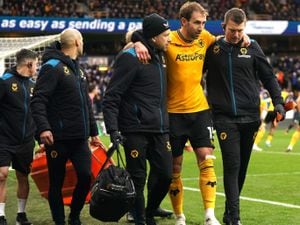Matt Maher: Talk is great... now Wolves fans want action
Wolves delivered a lot of words this week.
Nearly 39,000 of them, to be precise, blasted onto their website on Tuesday morning in the second Ask Wolves series: 11 interviews, accessible in video, audio and written format, conducted with pretty every member of the club’s hierarchy from chairman Jeff Shi and head coach Bruno Lage, to academy chiefs Laura Nicholls and Jon Hunter-Barrett.
It’s an undertaking worthy of some praise. Certainly, no other Premier League club has delivered such extensive pieces with the people responsible for running the show.
You might quibble it was an in-house production and therefore possessed an element of safety. Yet the questions, the majority submitted by supporters, were asked by Express & Star columnist Johnny Phillips and drew several nuggets of interesting information, such as Shi’s confidence the club will be floated on the stock market in the next five years.
Words, of course, can only do so much. Ahead of next Friday’s official opening of the transfer window, the focus of most supporters is on the actions Wolves will take, during what is possibly the most important summer since the arrival of Nuno Espirito Santo in 2017.
Lage, his successor as head coach, would certainly appear to agree with that outlook, admitting the next few months and squad rebuilding (or “reshuffling” to borrow a phrase used by Shi) will likely come to define his reign. Established dressing room voices such as John Ruddy and Romain Saiss are definitely departing, while there are doubts over star men like Joao Moutinho and Ruben Neves.
The acceptance by technical director Scott Sellars the club would need to be “realistic” with regard to the latter’s future took most of the headlines, though it could hardly be called a startling revelation. Anyone looking for such among the words of Sellars, Shi and Lage was always going to be disappointed. So too were those hoping for a change of tack when it comes to transfer strategy, or to put it more bluntly, a promise to splash the cash.
Instead the core theme, just as it has been for the last couple of seasons, was pragmatism. Wolves are prepared to be bold and opportunistic if they see a deal with value worth pursuing, yet neither are they going to be making a huge outlay on signings without recouping a similar amount in sales. Long-term financial security is key.
“If we’re talking about the priority, we always put the owner’s safety, the staff’s growth, maybe ahead of fans’ requirements for one or two more players,” explained Shi.
Still, it was impossible not to notice the contrasting forces at play between those responsible for the team and those who must also concentrate on the finances.
Lage stated his desire for two or three additions on top of replacing any departures and even delivered a warning as to the consequences of squad depth not being addressed. Sellars claimed the focus would be on “one or two” key areas, while Shi suggested he didn’t know the precise size of the transfer budget.
More cynical members of the fanbase might find that concerning, while the more considered view is such relationships are the same at pretty much every club. The only possible course of action, in truth, is to wait and see how things play out. It is impossible to make any judgement of a picture before it has been drawn. Come the end of August and deadline day, we will know far more.
What words can do, for now, is set the tone. Shi’s interview, while admirably honest, couldn’t exactly be described as the kind to energise a fanbase.
In some ways it is understandable. With six years of working in football under his belt, Shi cuts a far more battle-hardened, wiser figure than the man who arrived in 2016 with ambitions of chasing down Manchester City. Bold statements which might eventually come back to bite are very much a thing of the past and he is happy to admit as much.
Just as last year, when the club aired the first Ask Wolves, Shi spoke at length on the importance of the bigger picture and growing the Wolves “brand” and again, that is fair enough. Just like every club who aspire to crack the hegemony of the Premier League’s big six, Wolves must come up with different ways of increasing revenues to balance the financial playing field. Manchester United might be doing a rather good impression of a basket case, yet their revenues are 1,000 per cent those of Wolves. There’s the stark reality.
The trouble with talking so much about e-sports, record labels and fashion is it risks creating the impression football is secondary. No matter the ingenuity shown in developing other markets, nothing increases the popularity of a football club like winning football matches. On a similar note, suggesting the opinions of supporters overseas are as valid as those shelling out for increasingly expensive season tickets might also be considered a risky tactic.
Yes, Wolves may be markedly changed from the club Fosun purchased but any long-term success depends on maintaining a strong connection with the public.
Perhaps if anything, Shi is guilty of being too honest. After all, his thoughts are no different to the vast majority of football club chairpersons and CEOs up and down the land, the key difference being few others ever express them so explicitly.
One thing Shi is right to point out is, for any misgivings over strategy, Fosun have got a lot more right than they have wrong over the past six years.
Their approach has so far delivered Wolves’ most successful period in decades. The challenge now is to continue it. An interesting summer lies ahead.





